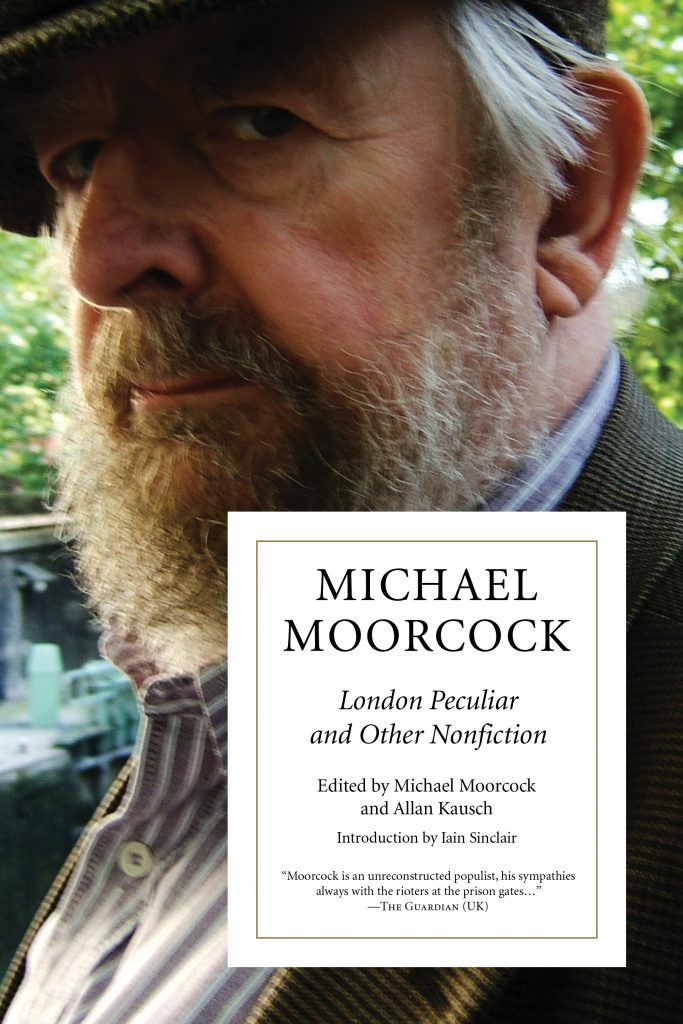by John H. Stevens
SF Signal
April 11, 2012
REVIEW SUMMARY: An erudite, edifying literary journey with a perceptive, witty raconteur. No, really!
MY RATING: four and a half stars out of five
BRIEF SYNOPSIS:
A prime selection of Moorcock’s articles, reviews and opinions selected
by the man himself. Moorcock writes with fondness and verve about his
home city, his life as a writer, and about literature and culture.
MY REVIEW:
PROS: Delightful variety; evocative writing; meticulous and enjoyable reminiscences and ruminations.
CONS: Some entries are flat, while others may not be of interest to genre fans.
BOTTOM LINE: A mosaic memoir of Moorcock’s life that shares his insights into life and literature.
Michael Moorcock is witty, and he knows it. The tone of the writing throughout London Peculiar and Other Nonfictions
is one that combines surety, charm and cleverness, creating a vibrant,
consistent voice through the variety of offerings in the book. Moorcock
has compiled a selection of his writing over the course of fifty years,
ranging from very personal reflections to journalistic pieces on topics
of the moment. The collection contains diary entries, published
journalism, introductions to books, reviews, a cornucopia of non-fiction
writing covering topics from life in WWII London to the deaths of
friends. While the collection ranges widely in subject and time, you
glean a definite sense of Moorcock as a writer and person. London Peculiar
reads like a mosaic memoir of Moorcock’s life, and his love and
appreciation of that life emerges strongly from this book.
The book is
organized by themes, some of which feature one sort of writing (for
example, “Other Places” is mostly entries from Moorcock’s diary). Over a
third of the book is comprised of the most general subject,
“Introductions and Reviews,” but others range from a small “Politics”
section to one on “Absent Friends.” The book opens with reminiscences
about Moorcock’s early life in London, from surviving the Blitz to
getting his first writing job. What quickly becomes clear is the
inextricability of Moorcock’s outlook from London’s influence. While he
later moves to the U.S. and lives and travels to many places, London is
always a reference point, even in his fiction writing. “The
metamorphosis of Blitzed London became the Chaotic landscapes of Elric
the Albino” (21). From his love of and experiences in London an astute,
whimsical cosmopolitanism emerges from his writing and creates a thread
through the collection that ties it together in subtle, sometimes
surprising ways.
Fans of his heroic fantasy novels may feel a bit
disappointed by this book; Moorcock writes little about his iconic
creation Elric of Melniboné, and only part of the book examines
fantastic literature (under several different rubrics, including
‘visionary literature’). He also notes in several entries that he has
not read in the genre for many years. What he does discuss, however, is
the effect of his years of writing SF/fantasy and editing New Worlds on
his own perspective, and what lessons he believes can be taken away from
that work. In “A Million Betrayals,” for example, he discusses what he
was striving to accomplish with that work:
”As I had often insisted in New Worlds
editorials, I thought that good escapism should confront real issues,
and the confrontational fiction should always contain an amount of
escapism, no matter how experimental the form. One reason I never wrote
fantasy and sf under a pseudonym was because I thought it important to
reunite popular and literary forms. That was why I had been attracted to
visionary fiction in the first place” (p. 203).
This idea of
engaging and pushing literary forms is the underlying story that
Moorcock is telling with London Peculiar. Taken together these entries
describe, from manifold angles, his lifelong quest to inject new
vitality into literature and to understand the world through it, to
examine literature’s capabilities and challenge them in the context of a
life driven by curiosity and a growing sense of purpose. “I took over
New Worlds magazine, determined to bring some fresh conventions that [J.
G.] Ballard, Barrington Bayley, and I felt were needed to reinvigorate
English fiction” (45), he notes in one entry, and this determination is
what fully manifests over the course of the book. Even when writing
about his musical efforts or his childhood, there is a powerful sense
of drive and ambition in the narrative arc of Moorcock’s life that, like
his voice, creates a sense of continuity through the collection. In
what he does, as well as in how he writes about it, a strong
biographical picture emerges. This speaks to the excellent editing of
the book as well, but by the time you reach the largest section of the
book, Moorcock’s writing has set both a pace and tone that frames his
writing on literature with clarity and stimulates an enthusiasm in the
reader to step deeper into his literary mind.
The last section
of book was, for me, the most satisfying; Moorcock displays his
historical knowledge of literature and his critical love of fiction
here. Moorcock unearths a number of literary gems for the reader to
marvel at, and contextualizes and rhapsodizes about them wonderfully.
His introductions to R.C. Sheriff, H. G. Wells, and Rudolf Nassauer are
deep and lucid, setting the scene for both novel and author. I found
myself adding books to my reading lists and jotting down points to think
about later as I read. Moorcock’s introductions are not only
informative, but they make you want to read the book. He passes on to
the reader facts and enthusiasm with equal facility.
My main
criticism of the book is one common to any collection: that not all of
the writing measures up to the general standard exemplified by the
writer. Some of the reviews in the final section fall short of the
benchmark that Moorcock establishes with the rest of his writing.
They are not just too brief, but too cursory. Some of them perform admirably, such as his review of Robert Holdstock’s Mythago Wood, while others barely pierce the surface of the novel, such as his review of Michael Chabon’s The Yiddish Policeman’s Union.
Often the ones that fall short are written for newspapers and
periodicals. That may be an effect of the intended audience he is
writing for, but there times in my reading when I wanted more than what
Moorcock delivered. These moments are few, however, and for the rest
it’s a pleasure to read essays and reviews by someone who not only loves
books but loves thinking and whose investment in the book being
discussed is obvious. Moorcock’s best reviews loop back to the
underlying story of London Peculiar, as they are his
reflections on the dynamics of literature and life. They are not only
great essays, but are lessons in how to write great essays. In fact, the
extra half-star for this book is specifically for this last section,
which brings us into Moorcock’s life in a different way than diary
entries, in a manner more profound and accessible. Moorcock’s nonfiction
is about the story of his life and the stories in his life, and he
shares both of them abundantly with the reader.
Back to Allan Kauch’s Author Page | Back to Michael Moorcock’s Author Page







